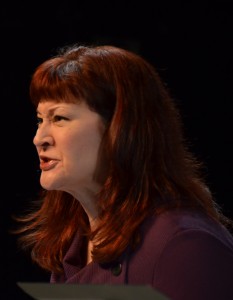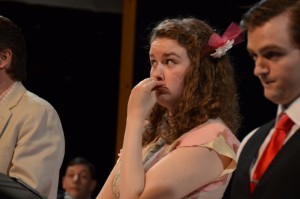SHAW FRACTURES A FAMILY
In 1896 George Bernard Shaw wrote You Never Can Tell (the title suggests a plot packed with surprise), his answer to the recently successful The Importance of Being Earnest. He’d beat Oscar Wilde at his own playful plotting and acerbic wit. Well, we know how well that went, considering how often it’s not revived. Still one of the better-known offerings in his “Plays Pleasant” collection, Shaw’s comedy is in fact successfully serious stuff.
Shaw can’t help it: Ideas will out. They transform the characters as much as Oscar’s wit shaped his silly subjects. The title’s implication that chance causes all is belied by an earnest and driven drama, here elegantly reprised by Robert Scogin in this chamber theater production, seamlessly presented by nine polished performers from as many music stands. (Well, Shaw calls his emotionally notated dialogue “word music”–and ShawChicago takes the suggestion quite literally.)
For the last 18 years the free-thinking Mrs. Clandon (Mary Michell, looking flustered but fierce), her feminist-minded elder daughter Gloria (imperious Barbara Zahora), her silly soubrette of a younger daughter Dolly (Allison Cook) and her twit brother Philip (Zachary Paul Lawrence) have lived in Madeira. Returning a seaside resort in Devonshire, this iconoclastic clan, following clumsy instructions from a family solicitor (Jonathan Nicols), encounter and expose the father whose brutish behavior ended the marriage in a separation that became an exile.
Reunited with his happily abandoned loved ones, irascible, 67-year-old Crampton (Skip Lundby, not quite holding his own since he seems defeated from the start) is appalled at their independence of mind, which he misconstrues as insubordination. This pillar of conservative respectability claims control of his supposedly insolent children. A custody battle, more a clash of concepts in upbringing (or downbringing, as Crampton sees it), is on.
 Meanwhile, proudly rational and opposed to the thralldom of marriage, proto-feminist Gloria finds herself ambushed into romance with Valentine (Christian Gray, consummately complex), an eloquent dentist and inveterate charmer whose experience in love Gloria both resents and requires. (Valentine disarms her with his self-deflating confessions: Of course he’s a fortune hunter, he admits: How could she be expected to live off of his meager earnings?)
Meanwhile, proudly rational and opposed to the thralldom of marriage, proto-feminist Gloria finds herself ambushed into romance with Valentine (Christian Gray, consummately complex), an eloquent dentist and inveterate charmer whose experience in love Gloria both resents and requires. (Valentine disarms her with his self-deflating confessions: Of course he’s a fortune hunter, he admits: How could she be expected to live off of his meager earnings?)
Their hot-and-cold, Beatrice-and-Benedict tug of hearts is as delightful an emotional counterpoint as Shaw can invent. Of course, for Shaw the Life Force or “duel of sex” (as he puts it here) is the power of evolution to make opposites attract so nature can profit from the chemistry. It must and shall win out. Wryly commenting on what fools these mortals be is Jack Hickey as William, a whimsically philosophical waiter who, well, never can tell. Then there’s the play’s deux-ex-machina, a paradoxical, Wilde-like stuffed shirt named Finch M’Comas (Jonathan Nichols): A Queen’s counsel, he all too easily remedies the custody battle and delivers Shaw’s dry reduction of life to strife.
Scogin excellently referees the playwright’s verbal tennis matches in this four-act romp. He happily ends the 140-minute feast of fools with a waltz that seamlessly reconciles Shaw’s delightful differences. By the end we’ve enjoyed a delightfully illustrated lecture in the power of love to subdue even the most contrary characters, the imperative of change to keep families fresh, and the importance of seeing Shaw.
 photos courtesy of ShawChicago
photos courtesy of ShawChicago
You Never Can Tell
ShawChicago Theater Company
Ruth Page Center for the Arts
1016 N. Dearborn St
ends on March 28, 2016
for tickets, call 312.587.7390
or visit ShawChicago
for more Chicago Theater info,
visit Theatre in Chicago





